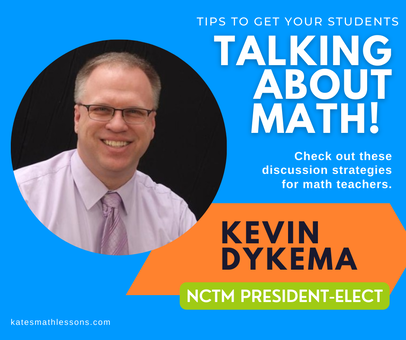|
Ever tried to have a discussion about math with your students and just get crickets? Or there's the one or two students who love to talk and everyone else just waits for them to answer? . . . Just me? I've always wondered how students can have so much to talk about on their way into class, but then can clam right up when you ask a math-related question. Why is it so hard to get students talking about math and what strategies can we use as teachers to make it easier to facilitate discussions? I had a chance to sit down with Kevin Dykema, the President-Elect of the National Council of Teachers of Mathematics to see what he had to say about the matter Kevin Dykema has taught 8th-grade math in southwest Michigan for the past 26 years, he consults with school districts throughout the US, is a national speaker, and is now the NCTM President-Elect. He has a lot on his plate and so much wisdom to share! I had the opportunity to meet him this summer at the Pennsylvania Council of Teachers of Mathematics conference and was surprised to learn that we both lived in the same small town in Michigan at one point - small world. I'm so grateful he was willing to sit down and share his advice to help teachers get students talking about math. Here's a peek into our conversation: Why is it important to get students talking in a math class? "When students are talking about math in math class, they are much more likely to be actively engaged in their learning than when they are sitting passively and listening (or not really listening). Through discourse, students are able to process the concepts being learned and begin to make connections to other content. For many teachers, we started truly understanding the math content we teach when we had to start talking about it- the same holds true for kids. And having students talk about math makes teaching math so much more fun!" What are some simple strategies teachers can use to get students talking about math? "I like to begin with some “low stress” dialogue opportunities and find things for them to talk about that don’t have a “right or wrong” answer. For example, I like to use estimation180.com and Which One Doesn’t Belong (wodb.ca) as some starting activities. Students need to get comfortable with talking about math in math class before discussing new content. I think it’s also vital to consider some of the logistics. You can save time as a teacher by assigning their partners as well as identifying who talks first. By letting them choose a partner and deciding who talks first, you may lose 5 minutes of valuable instruction time as they don’t often decide very quickly." It often seems there are a small handful of students that do most of the talking. "I like to use Think-Pair-Share frequently. This increases the likelihood of more students talking. Merely using this though may not result in more students being willing to share their thinking. But as I’m monitoring and eavesdropping on those conversations, I can ask some students to share their thinking when we have our full class discussion. I also like to ask if someone would you like to share what they heard in their group rather than asking them to share their thinking. By asking them to share what they heard, no one needs to know whose thinking is being shared - this can help with students who are afraid of being “wrong”.' Do you have any favorite websites that you would recommend to help facilitate discussions?In addition to the 2 mentioned earlier, there are so many great websites that help motivate discourse. Some include: https://www.wouldyourathermath.com https://www.101qs.com https://www.openmiddle.com https://www.visualpatterns.org As the President-Elect of the National Council of Teachers of Mathematics, is there anything |

